What did you do at the weekend? Chances are, 14% of you shopped at a farmers’ market.
The first farmers’ market in London opened in Islington in 1999. A year later, in 2000 I began working for London Farmers Markets.
“Do you know how to make mayonnaise? Can you show me how?” No problem at all, but it wasn't what I'd expected on my first day working for LFM. Nina Planck had interviewed me, chosen me to work with her from her elegant Islington townhouse. She was writing a cook book. Mostly on my own, I was getting to know the farmers and producers who came to sell, and running the markets.
A farmers’ market sells locally produced goods to local people. The concept is obviously not a new one. Farmers have bartered and sold goods as far back in history as agriculture itself.
Farmers’ markets help to add vitality to urban centres, making shopping a sociable and enjoyable experience.
They benefit farmers, consumers, the environment, and the community, providing direct contact and feedback between customers and producers.



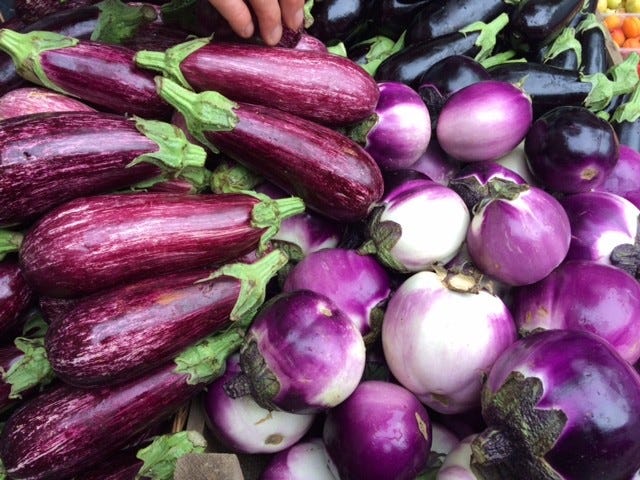
Money circulates in the local community, spent at local businesses before and after a farmers’ market shop.
They raise awareness about where food comes from and how it is produced.
You can buy as little or as much as you want if the produce is sold open. Bring your own bags and containers so there’s less packaging and waste. And whilst you’re queuing, you can swap recipes with your neighbour!
When I left the company last year in my 23rd year of working for LFM, there were nineteen markets. (The twentieth has just opened in East Finchley). When I joined, there were three. Islington, Notting Hill and Swiss Cottage all opened in 1999 and are still going strong. One of my first visits was to see the newest market that had opened in March 2000 at Camden Lock, by Dingwalls. Some locations are more challenging than others. We soon found that local people don’t want to shop among the thousands of tourists who flocked to the lock.
Incredibly, we opened six more markets that year, in Windsor, Wimbledon, Palmers Green, Blackheath, Twickenham and Peckham. Out of these, Wimbledon, Blackheath and Twickenham continue to be strong community markets, loved by their fiercely loyal customers. Market locations I found are still thriving in Pimlico, Marylebone, Queens Park, Walthamstow, West Hampstead, and Parliament Hill.
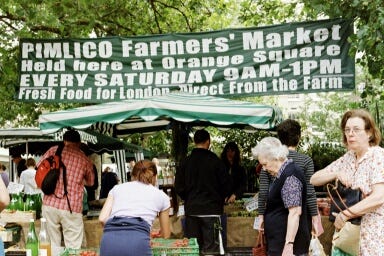
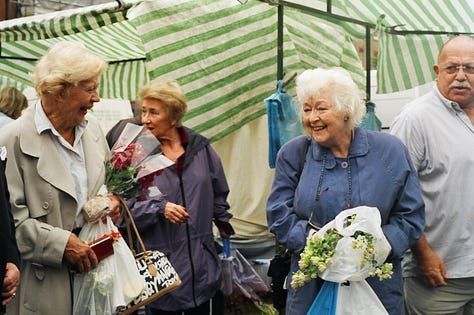

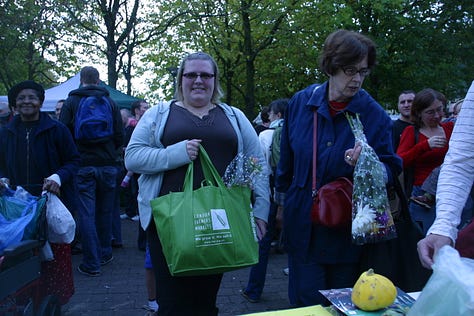


My friends say about me: put me anywhere in the world and I'll find the places where local people shop for food, eat and drink. I’ll gravitate to a local market like a duck to water. I'm equally enthusiastic about supporting farmers, and local food systems. Keep farmers farming. Give people an opportunity to buy fresh, seasonal produce direct from the source. Cut out the middlemen, the wholesalers, the supermarkets.
Keep the profits with the people growing the fruit, raising the animals, catching the fish. Begin relationships between the consumer and the grower, and set a pattern that will continue with their children.
I've seen children growing up coming to their local farmers’ market. From shopping with their families, to their first weekend jobs, honing their maths skills and struggling with early starts on a farmers’ market stall.
London Farmers’ Market rules are strict which could be problematic at times but provide assurance for customers. If you grow apples, but don't press the juice yourself, can you sell it? What about if you apply to sell cheese, but buy in the milk? Being strict means that customers can rely on the markets, know that they're buying from, and supporting farmers, not wholesalers.
Many customers find farmers’ markets confusing, assuming for example that they’re all organic. There will be organic stalls, but it would be impossible for them all to be so. There's only one organic farmers’ market I'm aware of. Practically, there wouldn't be enough farmers to attend all markets if they were organic. Tell people you run farmers markets and there’s a high chance they’ll say how much they love Borough Market, despite it being a market with a huge number of wholesalers and importers.
There is no legislation which prevents someone from setting up a car boot fair and calling it a farmers’ market. Sandra Woodhull who represents farmers’ markets on the board of the Farm Retail Association told me that in her area of Kent there are probably between 60-90 markets, including her FRA certified farmers’ markets. The others, calling themselves makers markets or artisan markets are all after the same farmers and stall holders as her organisation but, she says; ‘The new markets are in it for the wrong reasons’.
The FRA’s enthusiastic chair, Emma Mosey states that it’s ‘ground zero’, with plans to bring back criteria for farmers’ markets. Statistics about customer numbers and farmers markets across the UK are lacking; she agrees that they need to bring them up to date. It’s not easy finding an accurate search tool for your local farmers’ market. The FRA lists the 38 that have been Certified as genuine. Big Barn is the best UK wide alternative but do your research if you want a real farmers’ market.
It’s easier in the USA. As reported by The Independent, ‘The U.S. Department of Agriculture has a local food directory where farmers’ markets, food hubs, and on-farm markets can voluntarily list their information. Nearly 7,000 farmers’ markets are listed there, up from about an estimated 2,000 in 1994, per the the Farmers Market Coalition.’
If customers don’t understand what a farmers’ market is, it’s the same for journalists. When I was honoured to be included in the Evening Standards 1000 influentials list, they called me ‘Queen of Organic Markets’. I dropped the organic and kept the rest of the title.
Rules differ across the UK. Some farmers’ markets allow craft stalls, or the product that caused the most arguments across market organisers; olives. Not grown in the UK so logically, not allowed, but if they're marinated here, some market organisers let them in. Plenty of journalists have gleefully written articles if they find bananas or oranges at a ‘farmers’ market’ or disclose a wholesaler. If you're letting in wholesalers and importers and calling your market a farmers’ market, you're deceiving your customers but for the majority of us, running bona fide farmers’ markets, it’s all about supporting farmers and selling direct to customers.
London Farmers Markets tag line says it all;
We Grow It
We Sell It
If you're not sure of something, want to check ingredients, welfare standards or ask questions, the stall holder is there to help.

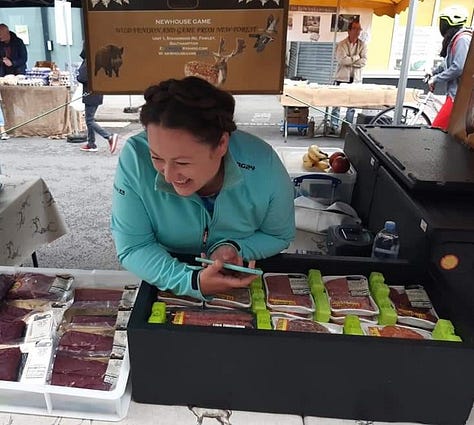
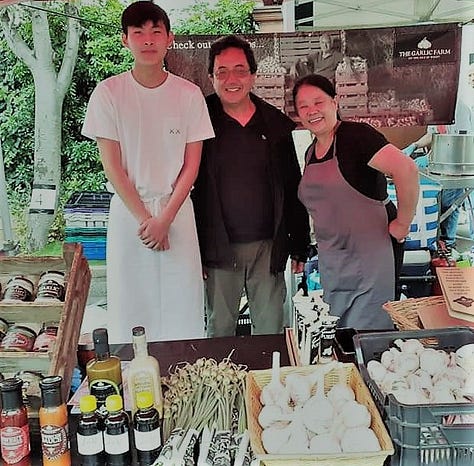
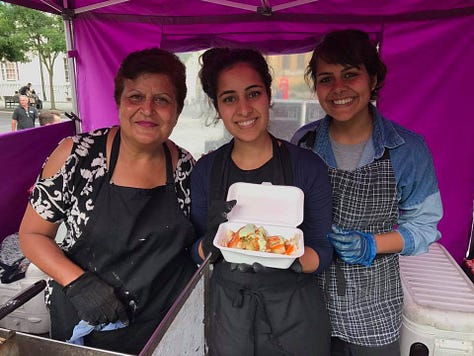
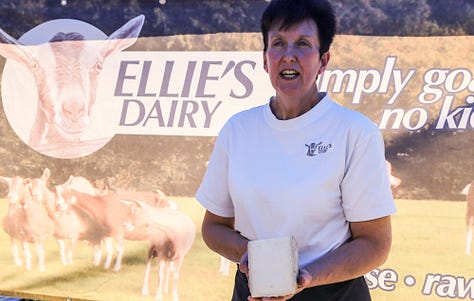

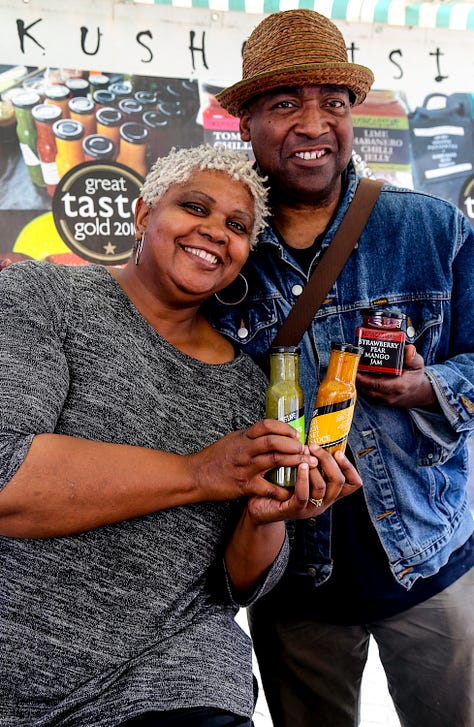

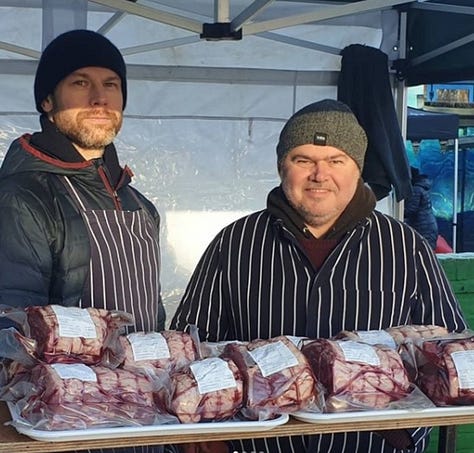
Questions I was asked most often;
Can I buy unpasteurised milk? Yes, thankfully, yes you can. And cream too. The most wonderful tasting dairy you’ll ever find. And some dairies encourage you to bring your own bottles and fill them up at market.
I'm looking for strawberries\aubergines\courgettes (usually asked in winter). You know the answer to that one.
Why is everything so expensive? What is the real cost of food? I kept saying; ‘there’s no such thing as cheap food, someone, somewhere will always be paying the price’ but unfortunately, if we can afford to, we don’t want to, and if we can’t afford to, we’re stuck with food that is sold as cheap. Everyone deserves good, fresh food.
In the 1950’s, we spent a third of our income on food shopping. This decreased to 24% in 1974. Whilst consumer spending has doubled since 1985, the amount we spend on food, as a percentage of our total spending, has gradually decreased, from 11% in 1985, to 7.3% in 2015.
Whilst on the board of London Food I pushed for a report on the economic impact of markets which resulted in a report by the New Economics Foundation. It found that
‘Farmers’ markets are more price competitive than is often presumed and, as the price analysis demonstrates, can compete effectively with supermarkets.’
Here’s the crux. Farmers markets reflect the real cost of growing food in the UK. Supermarkets have skewered the price of food to the extent that we believe their pricing. Thousands of farmers have been driven out of business because supermarkets would rather pay for lower welfare produce from other countries instead of supporting UK farms.
I’d like to see a rise in the minimum wage. Everyone should be able to afford to buy good ingredients and not rely on ultra processed foods. And a basic income for farmers.
At a talk called Bridging the Gap as part of the British Library food season, Professor Christine Vogel, Professor in Food Policy at City University advocated for a cap on the top CEO salaries.
A new type of supermarket was once trialed on London’s Kings Road. Sainsbury’s opened a ‘Market’, with fruit and vegetables in wicker baskets and produce in greaseproof paper. They said that produce would ‘only be stocked if in season’, but also said that produce will come from specialist producers around the world. After all, everything is in season in some part of the world. The word ‘heritage’ has been overused, as has ‘artisan’ but they belong back in farmers’ markets.
Purple carrots. Sprouts on stalks. You saw them first at farmers’ markets. Vegetables, fruit and salads are fresher and will last longer, and you’ll find produce you’ll never see in supermarkets from beautifully named apples to wild game in season. And often, you’re buying directly from the farm or producer who’s grown the fruit, planted the corn, made the cheese and raised the pigs.

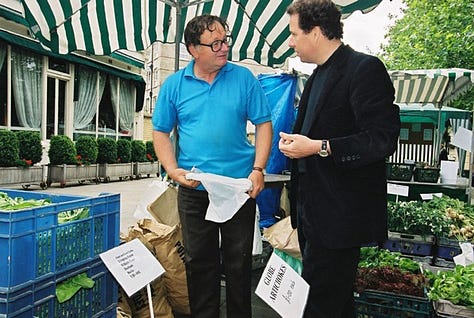
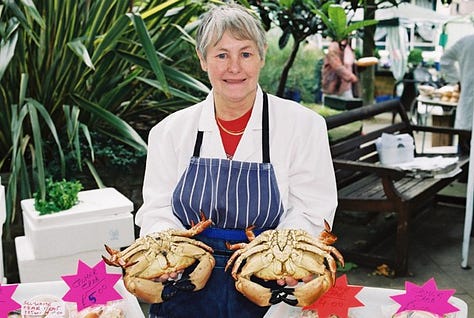
We need farmers’ markets, and we need our farmers. So many times during a conversation with a farmer they’d say, we wouldn’t be here today if it wasn’t for farmers markets. They’ve been a life line.
The average age of a farmer hasn’t changed in years. In 2023, the highest proportion of farmers (35%) were aged 65 years and over, 32% were aged 55 to 64 years and 18% were aged 45 to 54 years. By contrast less than 20% of farmers were aged 16 to 44 years and of those, 1% were aged 16 to 24 years.
There are young farmers; those who have family with land or are lucky enough to rent but there must be more help from the Government to get new farmers into the system. Access to land shouldn’t just be for the chosen few. Some years ago and mostly tongue in cheek I suggested a new and revised land army, whereby school leavers could take a year out to work on farms. The current government has come under fire for suggesting something similar but is a land army such a bad idea? So many people have no idea where their food comes from. Those who want to learn; I’m not talking about forcing anyone- could have farm placements, apprenticeships paid for by sponsorship.
I’m glad to see organisations like The Landworkers Alliance working to address the inbalance:-
‘New Entrants – who are eager to replace retiring farmers and rejuvenate the sector – currently face multiple barriers to entry, including the ever-increasing price of farmland, a near absence of starter farm opportunities, a lack of suitable training and funding, and the discouraging ongoing sell-off of county farms.



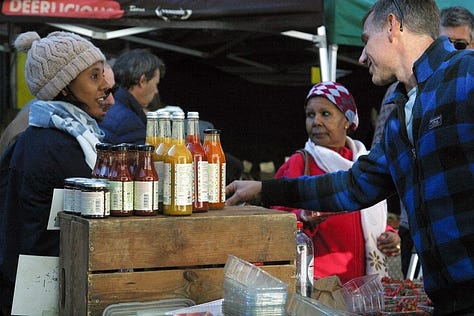
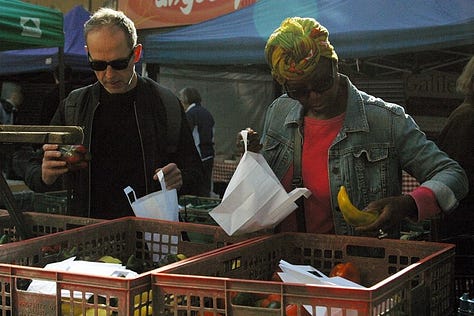


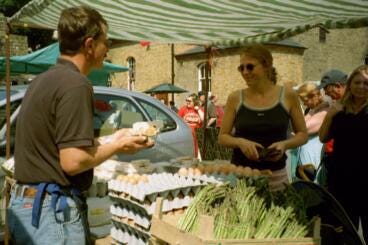
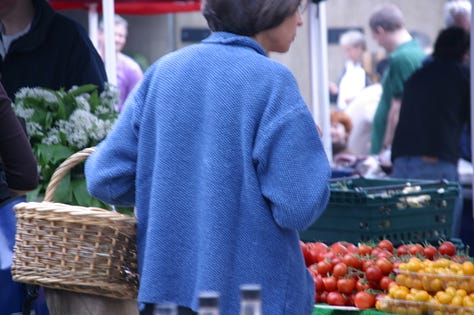
Human connection make people happy. Are we happy when we buy food?
For many families, it’s a luxury to have time to amble to a farmers market with bags for life and reusable containers. Most people are more likely to round up the kids, try to keep them contained and away from the sweets aisle in the supermarket and shop as quickly as possible, to get home to cook as fast as possible.
Time is an aspiration. To be able to choose, to ask questions, to buy something according to seasons, and not because it's on offer or because one of the kids is only eating purple food. To buy high welfare chicken or pork. Wanting to cook with something new, but not having the energy to know how to persuade the rest of the family to eat it. Wanting to buy non UPF foods, and finding that your other half has sneaked a dozen UPF items into the trolley.
During my time at LFM we went through mad cow disease, horsegate, COVID and BREXIT. Sheila Dillon provides an excellent summary of how mad cow disease is the cost of cheap food. Film crews and journalists descended upon the markets during the horse meat scandal 11 years ago.
During COVID we went out of our way to provide safe shopping environments for customers and stall holders, limiting numbers and spacing out stalls, showing that it was safer to shop outdoors in the fresh air than indoors.
We saw during COVID, and during last years extreme weather conditions how vulnerable supermarkets are. The average storage capacity of a supermarket is only one day’s worth of fresh products. Remember the empty supermarket shelves? Not just because of supply issues, but because supermarkets would rather have empty shelves than pay fair prices.
Farmers’ markets saw an increase in footfall during COVID, and when supermarket shelves were bare. Farm shop owner Steven Medley argued that;
“Supermarkets have for too long drummed into peoples’ heads that food is a cheap commodity, and it isn’t. The government has either got to do something to support growers, or supermarkets have got to be prepared to pay growers a fair price.”
In the UK we only grow 17% of the fruit and vegetables we consume. We can do so much better than that. Support your local farmers, whenever your budget allows. It’s always heartbreaking to hear, as Sandra Woodhull told me, of a Kentish farm that’s recently grubbed up their orchard because ‘there’s no money in apples’.


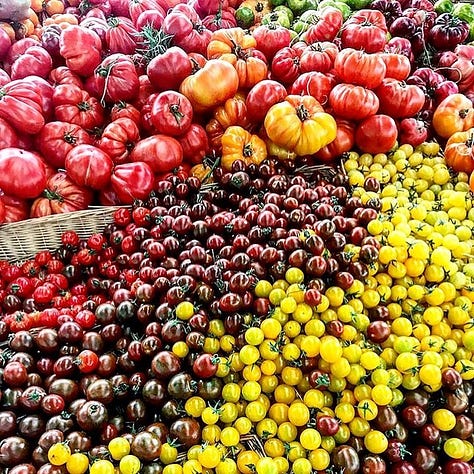
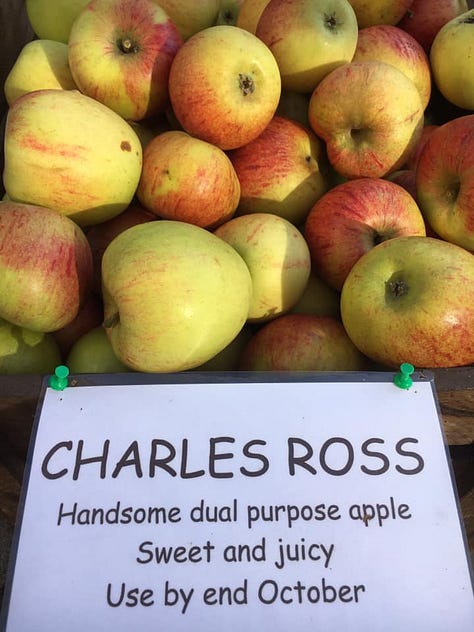


I’m not arguing that we need to be 100% food secure, growing all the food we need but we could grow more, and we could do more to ensure that the farmers we have stay farming. Jay Raynor may argue that shopping at farmers’ markets won’t change the world, but like making the swap from throwing away paper to recycling it, everything we do can make a difference, step by step.
Whilst at LFM, I wrote an article called Throwing Manure at Sacred Cows, a plea to stop viewing farmers markets as something sacred, and to see them as an ordinary place to shop. Yes I get it, they can be aspirational because of the price issues I’ve mentioned, but there will always be something affordable that’s comparable to supermarkets. The markets themselves shouldn’t be seen as somewhere to shop just for a jar of jam, or for the occasional bacon roll. At the time I wrote the piece, The Institute of Grocery Distribution had said that it is not a price driven marketplace, and that shoppers are driven by taste and quality. According to the IGD, 22% of shoppers will only buy UK produced produce and will pay a premium if necessary. It can be a tough job convincing would be customers that they’re getting a better bargain at the farmers’ market.
Friends of the Earth with the support of farming and public interest organisations, had carried out a survey of farmers in February 2003 to find out how farmers are faring under the March 2002 Code of Practice and in general under current market conditions.
More than half of dairy farmers (52%) said that they received the same as or less than the cost of production for their produce. More than a third of fruit and veg growers (37%) said that they received the same as or less than the cost of production for their produce. Nearly a third of livestock farmers (31%) said they received the same as or less than the price of production for their produce. So, the first case in point – at a farmers’ market, it’s the farmers who receive the profit, not supermarket shareholders. That’s even before you consider the differences in produce.
For supermarkets, low cost and long shelf life comes first.
The war with Ukraine caused energy and feed prices to increase and BREXIT made it difficult to recruit seasonal farm workers and to import farm machinery. The weather this year has made planting extremely difficult for farmers, as you’ll know if you shop at markets, or if you grow your own food. Many farmers have considered giving up.
For many years I’ve had a quote from Jane Grigson on my email footer;
‘We have more than enough masterpieces
What we need is a better standard of ordinariness’
And that’s my mantra. I’ve quoted it before and I have no issues quoting it again. Because that’s what farmers markets are all about. Here’s a challenge for you;
It’s World Localization Day on 21st June. Raising awareness about the need for a global to local shift. Challenging market shoppers and visitors to purchase a meal that is 100% local. It’s about being engaged in rebuilding healthy local economies, communities and food systems.
Where will you be food shopping next weekend?
Thank you for reading. Queen of Markets is free today. But if you enjoyed this post, you can tell me that you value my writing by pledging a future subscription. You won't be charged unless I enable payments.







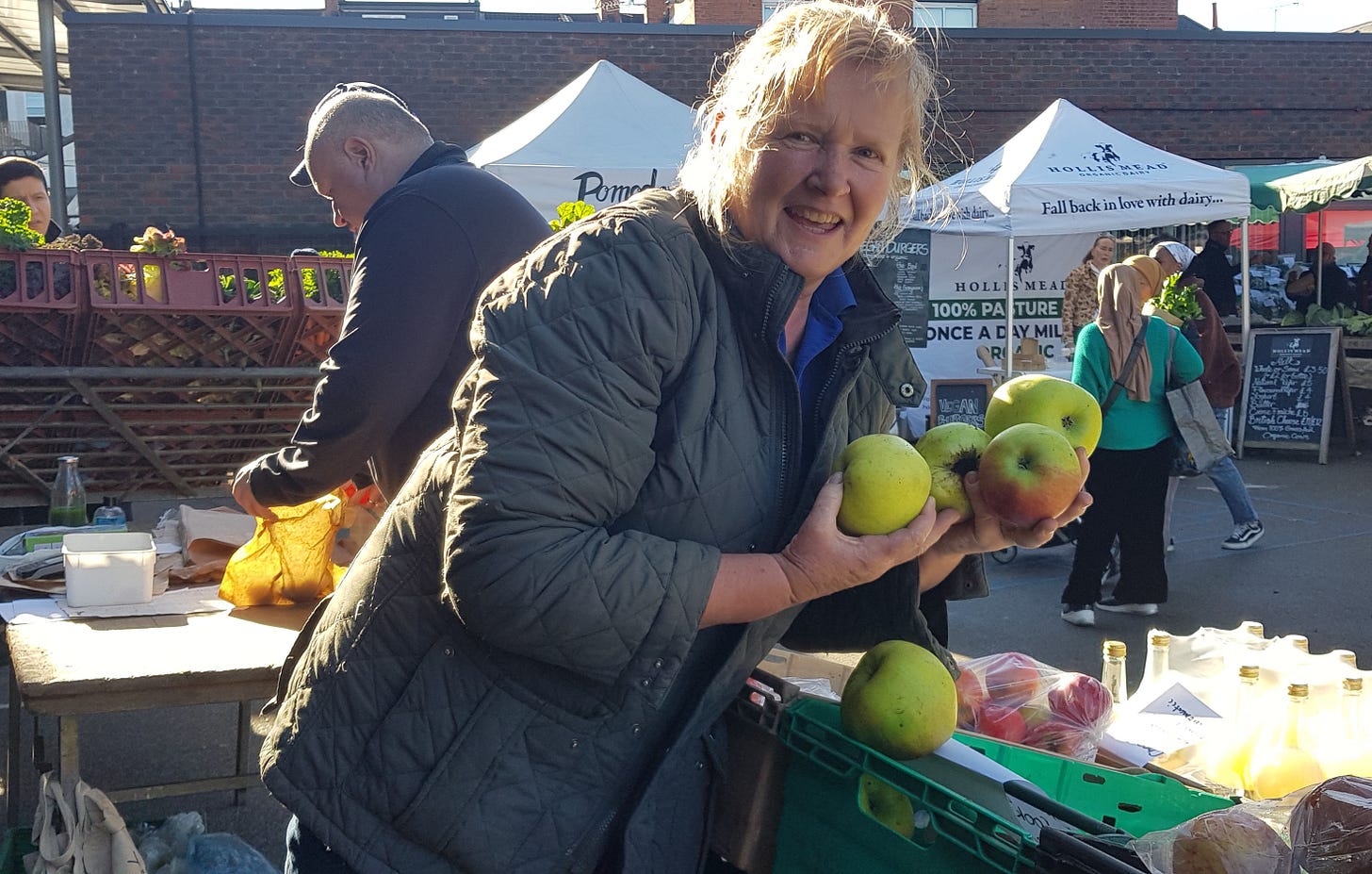
Fascinating resume of the progress of our Farmers' markets. And so many were started and survive thanks to your efforts Cheryl.
This is an excellent article about farmers markets in general. Though you write from a UK perspective, much of this applies to the US as well. And, hey, I'm very impressed by the photo of you with the future king!